Unitwillpeoplehaverobots
八年级英语下册《Uni Willpeoplehaverobots》教案 人教版

教案:八年级英语下册《Unit Will people have robots》教案人教版一、教学目标1. 知识目标学生能够理解并运用目标句型"Will people have robots?" 进行询问和回答。
学生能够掌握表示将来的助动词"will" 的用法。
学生能够理解并运用词汇"robots, future, technology, advance, dly life" 等。
2. 能力目标学生能够听懂并能够运用目标句型进行简单的交流。
学生能够通过阅读和听力材料,提高获取信息的能力。
3. 情感目标学生能够激发对未来的好奇心,培养探索科技的兴趣。
二、教学重难点1. 重点目标句型"Will people have robots?" 的运用。
表示将来的助动词"will" 的用法。
2. 难点目标句型的适当变体和运用。
词汇"robots, future, technology, advance, dly life" 的运用。
三、教学方法采用任务型教学法,通过听、说、读、写等多种活动,让学生在实际语境中运用目标句型和词汇。
四、教学步骤1. 导入利用图片或实物展示的图片,引导学生谈论。
2. 新课呈现通过动画或视频展示未来的情景,引导学生理解并掌握目标句型"Will people have robots?"。
3. 操练学生两人一组,用目标句型进行问答,教师巡回指导。
4. 练习设计阅读材料,让学生通过阅读理解并运用目标句型。
5. 输出学生分组讨论,设想未来的,并用目标句型进行交流。
五、课后作业1. 抄写目标句型"Will people have robots?" 并进行问答练习。
2. 收集有关的资料,进行阅读理解练习。
3. 家庭作业:以小组为单位,编写一篇关于未来的短文,并展示给全班同学。
unit-7-Will-people-have-robots知识点总结(推荐文档)

Unit 7 Will people have robots?语法:一般将来时一.重点短语1. fewer people 更少的人2.study on computers通过电脑学习3. a piece of paper 在一张纸4. live to be 活到…5. in ten years 十年后(用于一般将来时)6. live alone独居7. keep pets 养宠8.be able to 能够9.from now on 从现在起10. in the future 将来11.over and over again 一遍又一遍12.look for 寻找,强调动作的过程13. hundreds of+复数数以百计的14.play a part in doing sth 参与做某事15.on the earth 在地球上16.agree with sb同意某人/agree to do sth 同意做某事17.disagree with sb 不同意某人/disagree to do sth 不同意做某事18.be in great danger 处于极大的危险之中19.during the holiday 在假期中二.重点句子--What will the future be like? Cities will be more polluted. And there will be fewer trees.--W ill people use money in 100 years? No, they won’t .Everything will be free.--Will there be world peace? Yes, I hope so.--Kids will stay at home on computers. They won’t go to school.There will be fewer trees and the environment will be in great danger.Everyone should play a part in saving the earth.三.重点解析be going to+动词原形①表示打算、准备做的事。
八年级英语下册《Uni Willpeoplehaverobots》教案 人教版

八年级英语下册《Will people have robots》教案人教版章节一:课题引入教学目标:1. 让学生了解发展的现状和未来趋势。
2. 引导学生思考人们是否会有。
教学步骤:1. 向学生展示一些的图片,让学生猜测这些的用途。
2. 引导学生讨论在我们生活中的作用,如清洁工、医生等。
3. 提问学生:“你们认为未来人们会有吗?为什么?”4. 让学生阅读课文,了解人们是否会有。
教学评价:通过学生参与讨论和回答问题的情况来评价学生的学习效果。
章节二:单词和短语学习教学目标:1. 让学生掌握课文中的生词和短语。
2. 培养学生正确使用这些单词和短语的能力。
教学步骤:1. 让学生跟读课文,标注出生词和短语。
2. 教师讲解生词和短语的意思,并给出例句。
3. 让学生练习使用这些单词和短语造句。
4. 进行小组活动,让学生相互练习使用生词和短语。
教学评价:通过学生造句的正确性和流利度来评价学生的学习效果。
章节三:课文理解教学目标:1. 让学生理解课文内容,掌握课文的主要观点。
2. 培养学生运用所学知识进行思考和分析的能力。
教学步骤:1. 让学生复述课文内容,检查学生对课文的理解。
2. 教师提问,引导学生深入思考课文中的观点。
3. 进行小组讨论,让学生分享自己的观点和看法。
4. 让学生写一篇短文,阐述自己对课文主题的理解和看法。
教学评价:通过学生复述课文、回答问题和小组讨论的表现来评价学生的学习效果。
章节四:语法学习教学目标:1. 让学生掌握本课所学的语法知识。
2. 培养学生正确运用所学语法知识的能力。
教学步骤:1. 讲解本课所学的语法知识,如时态、语态等。
2. 让学生进行语法练习,巩固所学知识。
3. 进行小组活动,让学生相互练习使用所学语法知识。
4. 让学生写一篇短文,运用所学语法知识进行表达。
通过学生语法练习的正确性和流利度来评价学生的学习效果。
章节五:课堂总结与作业布置教学目标:1. 让学生回顾本节课所学内容,巩固知识点。
人教版八年级上Unit7 汉语翻译
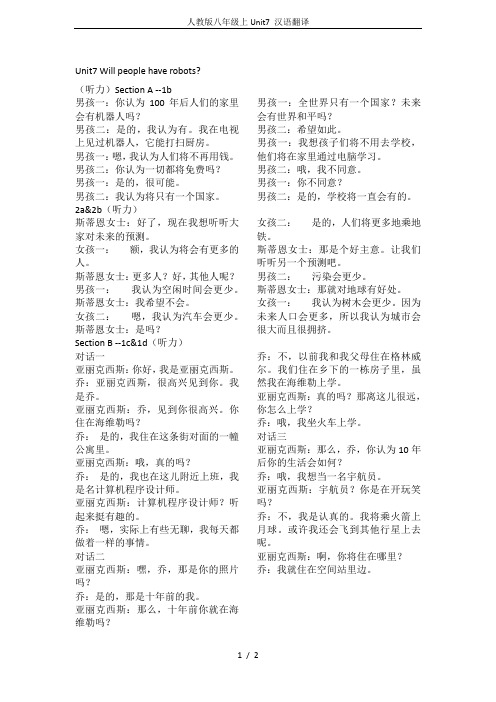
人教版八年级上Unit7 汉语翻译Unit7 Will people have robots?(听力)Section A --1b男孩一:你认为100年后人们的家里会有机器人吗?男孩二:是的,我认为有。
我在电视上见过机器人,它能打扫厨房。
男孩一:嗯,我认为人们将不再用钱。
男孩二:你认为一切都将免费吗?男孩一:是的,很可能。
男孩二:我认为将只有一个国家。
男孩一:全世界只有一个国家?未来会有世界和平吗?男孩二:希望如此。
男孩一:我想孩子们将不用去学校,他们将在家里通过电脑学习。
男孩二:哦,我不同意。
男孩一:你不同意?男孩二:是的,学校将一直会有的。
2a&2b(听力)斯蒂恩女士:好了,现在我想听听大家对未来的预测。
女孩一:额,我认为将会有更多的人。
斯蒂恩女士:更多人?好,其他人呢?男孩一:我认为空闲时间会更少。
斯蒂恩女士:我希望不会。
女孩二:嗯,我认为汽车会更少。
斯蒂恩女士:是吗?女孩二:是的,人们将更多地乘地铁。
斯蒂恩女士:那是个好主意。
让我们听听另一个预测吧。
男孩二:污染会更少。
斯蒂恩女士:那就对地球有好处。
女孩一:我认为树木会更少。
因为未来人口会更多,所以我认为城市会很大而且很拥挤。
Section B --1c&1d(听力)对话一亚丽克西斯:你好,我是亚丽克西斯。
乔:亚丽克西斯,很高兴见到你。
我是乔。
亚丽克西斯:乔,见到你很高兴。
你住在海维勒吗?乔:是的,我住在这条街对面的一幢公寓里。
亚丽克西斯:哦,真的吗?乔:是的,我也在这儿附近上班,我是名计算机程序设计师。
亚丽克西斯:计算机程序设计师?听起来挺有趣的。
乔:嗯,实际上有些无聊,我每天都做着一样的事情。
对话二亚丽克西斯:嘿,乔,那是你的照片吗?乔:是的,那是十年前的我。
亚丽克西斯:那么,十年前你就在海维勒吗?乔:不,以前我和我父母住在格林威尔。
我们住在乡下的一栋房子里,虽然我在海维勒上学。
亚丽克西斯:真的吗?那离这儿很远,你怎么上学?乔:哦,我坐火车上学。
八年级英语上册Unit7Willpeoplehaverobots知识点归纳(新版)
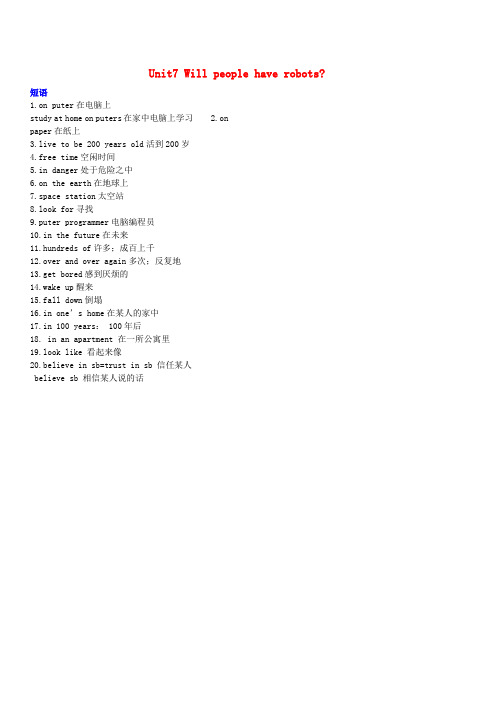
Unit7 Will people have robots?短语1.on puter在电脑上study at home on puters在家中电脑上学习 2.onpaper在纸上3.live to be 200 years old活到200岁4.free time空闲时间5.in danger处于危险之中6.on the earth在地球上7.space station太空站8.look for寻找9.puter programmer电脑编程员10.in the future在未来11.hundreds of许多;成百上千12.over and over again多次;反复地13.get bored感到厌烦的14.wake up醒来15.fall down倒塌16.in one’s home在某人的家中17.in 100 years: 100年后18. in an apartment 在一所公寓里19.look like 看起来像20.believe in sb=trust in sb 信任某人believe sb 相信某人说的话用法:1.will+动词原形将要做……2.fewer/more+可数名词复数更少/更多……less/more+不可数名词更少/更多……3.have to do sth.不得不做某事(客观) must 必须(主观)5.There will be + 主语+其他将会有……6.There is/are +sb./sth.+doing sth.有……正在做某事7.make sb. do sth. 8.help sb. with sth.帮助某人做某事9.What will the future be like ? 未来将会是什么样子?10.Which side do you agree with ?你同意哪一方的观点?。
unit-7-Will-people-have-robots知识点总结

Unit 7 Will people have robots?语法:一般将来时◆一般将来时基本概念一般将来时表示将来某一时刻的动作或状态,或将来某一段时间内经常的动作或状态。
由助动词shall或will加动词原形构成,shall用于第一人称,will用于第二、三人称。
除英国外的说英语的国家,在陈述句中,即使在第一人称一般也用will,在英国也有这种趋势。
在口语中,常用shall,will的缩写形式为’ll,如:I’ll,you’ll等。
Shall not的缩写式为:shan’t,will not的缩写式为:won’t.肯定句:I/We shall/will go.You/He/She/They Will go.否定句:I/We shall/will not go.You/He/She/They Will not go.疑问句:Shall I/we go?Will you/he/she/they go?◆一般将来时常与一些表示将来的时间状语连用,如:tomorrow(明天),next week(下周),from now on(从现在开始);in the future(将来)等。
其时间状语有如下几种1)this引导的短语如this year2)tomorrow及其相关短语如tomorrow morning3)next引导的短语如next month4)from now on in the future in an hour等。
◆一般将来时五种用法(1)Will/Shall+动词原形表示将要发生的动作或情况。
a.I will(shall)arrive tomorrow.我明天到。
b.Will you be free tonight?你今晚有空吗?c.We won’t(shan’t)be busy this evening.我们今晚不忙。
①在一般将来时的句子中,有时有表示将来时间的状语,有时没有时间状语,这时要从意思上判断是否指未来的动作或情况。
八年级英语下册《Uni Willpeoplehaverobots》教案 人教版

八年级英语下册《Will people have robots》教案人教版教学目标:1. 能够理解并运用本课的主要词汇:robot, future, housework, dangerous, helpful, factory, design, brn, different, work, job。
2. 能够理解并运用本课的主要句型:Will people have robots in the future? What will robots do? They will do different jobs. Will robots be helpful?Yes, robots will be very helpful.3. 能够听懂、说出一篇小短文,内容涉及未来的生活以及的应用。
教学内容:第一章:Lesson 1: Will people have robots in the future?1.1 引入话题:讨论未来的生活。
1.2 新词汇学习:robot, future, housework, dangerous, helpful, factory, design, brn。
1.3 句型练习:Will people have robots in the future? What will robots do? They will do different jobs.1.4 小组活动:学生分组,讨论在未来的生活中的作用。
第二章:Lesson 2: What will robots do?2.1 复习上一课的内容。
2.2 新词汇学习:work, job。
2.3 句型练习:What will robots do? They will do different jobs.2.4 听力练习:听一段关于工作的对话。
第三章:Lesson 3: Will robots be helpful?3.1 复习前两课的内容。
八级下UnitWillpeoplehaverobots知识汇总及针对练习

Unit 1 Will people have robots?一.短语1.在人们家中in people's home2.在家通过电脑学习study at home on computers3.将来in the future4.免费的be free5.活到200 岁live to be 200 years old6.一百年之后in 100 years7.一张纸a piece of paper8.更多/更少的树more/fewer trees9.更多/更少的污染more/less pollution10.更少使用地铁use the subway less 11.更多使用…use sth a lot12.同意某人的意见agree with sb13.与…谈话talk to/withsb14.使用某物做某事use sth to do15.在上小学be in primary school16.住在一间公寓livein an apartment17.乘坐火箭到月球fly rockets to the moon18.爱上…fall in love with…19.独自居住live alone20.能够做某事be able to do sth21.去香港度假go toHong Kong on vacation22.世界杯the World Cup23.飞到月球度假fly to the moon for vacation24.有朝一日one day25.为某人工作work for sb.26.看起来精神look smart27.实现come true28.预言未来predict the future29.看见某人(正)做某事see sbdo/doing30.数以百计的hundreds of31.在太空in space32.拥有某人自己的机器人have one's own robot 33.帮助某人做家务help with the housework34.在太空站on a space station35.与…做同样的事do the same things as sb36.叫醒某人wake up sb. 37.与…交朋友make friends with sb38.某地有某人正在做某事there be sb/sth doing sth +sp.39.看起来更像look more like40.一遍又一遍地over and over again41.有更少的工作去做have less work to do42.做某事有趣be fun to do sth 43.在25年到50年之后in 25 to 50 years44. 使某人做某事make sb. do sth.二.句子:1.每件东西将会免费。
八年级英语上册-Unit-7-Will-people-have-robots语法总结-同步写作指导省

short hair
r
University
In 20 years,I__________
robots, swimming
a son,a daughter
第7页
step1审清题目 审题裁:记叙文 审时态:普通未来时 审人称:第一人称 审关键点:1.外貌改变(2分);2.工作改变:职业和工作地 点(4分);3.兴趣改变:机器人和游泳(2分); 4.家庭改变:儿子与女儿(2分)。
第11页
Good_ _morning , everyone.I__am__glad__to__tell__you__something__abou t__the__beautiful__future__of__our__school._
_I__ think__ in__ the__ near_ _future , our__school__will__be__much__more__beautiful__than__ now.Because__we__will__plant__more__trees__and__flow ers__and__water__them__every__day.I__think__it's__im portant__for__us__to__keep__the__school__clean.___ Now,we__have__too__much__homework__to__do__every__da y.We__are__very__tired.I__hope__that__teachers__will __let__us__have__less__homework,so__ we__ will__ have__ more_ _time__ to__ relax__ ourselves.
八年级英语上册《Unit7Willpeoplehaverobots》的知识点归纳
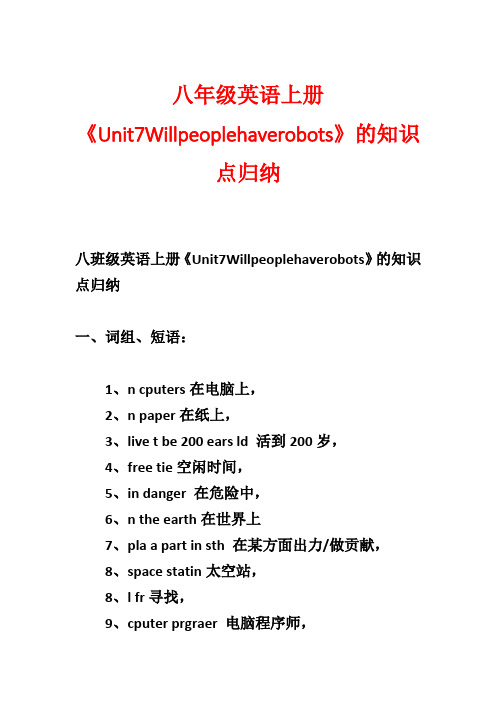
八年级英语上册《Unit7Willpeoplehaverobots》的知识点归纳八班级英语上册《Unit7Willpeoplehaverobots》的知识点归纳一、词组、短语:1、n cputers在电脑上,2、n paper在纸上,3、live t be 200 ears ld 活到200岁,4、free tie空闲时间,5、in danger 在危险中,6、n the earth在世界上7、pla a part in sth 在某方面出力/做贡献,8、space statin太空站,8、l fr寻找,9、cputer prgraer 电脑程序师,10、in the future 在将来,11、hundreds f成百上千的.,12、the sae…as与…一样,13、ver and ver again 反复,14、get bred 无聊,abe/perhaps 用于句首。
Mabe/Perhaps u are right.1. during / fr / in 介词,在……期间。
说到某事是在某一段时间之间发生的用during; 说到某事持续多久则用fr; 说到某事具体发生的时间用in.We visited an places f interest during the suer hlida.I’ve been here fr tw we es.The usuall leave schl in ul.一般将来时结构:肯定式:主语+ will/shall + 动词原形+ 其他will 用于各种人称,shall 用于第一人称。
主语+ be ging t + 动词原形+ 其他be 随人称、数和时间的变化而变换。
否定式:在will/shall/be 后面加nt. will nt = wn’t .一般疑问句:将will/shall/be 提到主语前面。
There be 句型的一般将来时:There will be + 主语+ 其他,意为:将会有。
八年级英语下册《Uni Willpeoplehaverobots》教案 人教版

八年级英语下册《Will people have robots》教案人教版教学目标:1. 能理解并朗读课文,掌握课文中的核心词汇和句型。
2. 能运用所学词汇和句型进行简单的日常交流,如询问未来科技的发展趋势。
3. 能通过课文学习,对未来的科技发展有所思考和展望。
教学重点:1. 掌握课文中的核心词汇和句型。
2. 能够运用所学词汇和句型进行简单的日常交流。
教学难点:1. 理解并运用情态动词will 的用法。
2. 正确使用疑问句和否定句。
教学准备:1. 课文教材。
2. 与课文内容相关的图片或视频。
3. 教学录音机或电脑。
教学过程:第一课时一、导入(5分钟)1. 引导学生谈论未来的科技发展。
2. 引入本课课题:Will people have robots?二、课文展示(10分钟)1. 播放课文录音,让学生跟随朗读。
2. 教师讲解课文中的核心词汇和句型。
三、课堂活动(10分钟)1. 分组活动:学生两人一组,用所学词汇和句型进行对话,询问未来科技的发展趋势。
2. 教师巡回指导,纠正发音和语法错误。
四、巩固练习(10分钟)1. 完成课本配套练习题。
2. 学生互相检查,教师批改。
五、总结与作业(5分钟)1. 教师总结本节课的重点内容。
2. 布置作业:让学生写一篇关于未来科技的小短文。
第二课时一、复习导入(5分钟)1. 复习上节课的学习内容。
2. 引入本课课题:Will people have robots?二、课文展示(10分钟)1. 播放课文录音,让学生跟随朗读。
2. 教师讲解课文中的核心词汇和句型。
三、课堂活动(10分钟)1. 分组活动:学生两人一组,用所学词汇和句型进行对话,询问未来科技的发展趋势。
2. 教师巡回指导,纠正发音和语法错误。
四、巩固练习(10分钟)1. 完成课本配套练习题。
2. 学生互相检查,教师批改。
五、总结与作业(5分钟)1. 教师总结本节课的重点内容。
2. 布置作业:让学生写一篇关于未来科技的小短文。
UnitWillpeoplehaverobots?SectionA课件人教版英语八年级上册

第2课时 Section A 2a~2d
一、 根据汉语或首字母提示完成单词。 1. There will be fewer trees in the future . 2. Chinese scientists sent a spaceship to the planet Mars to take photos in 2020. 3. We should try our best to keep our environment (环境) clean and beautiful. 4. I saw a movie about the future life on the earth (地球).
二、 用所给单词的适当形式填空。 1. We will have robots in our (we) homes. 2. Robots will be seen in people’s (people) homes. 3. There will be (be) more trees in the future. 4. You can use the pencil to draw (draw) a picture and send it to Tom. 5. There is (be) one teacher and forty students in the classroom.
三、 用方框中所给单词的适当形式填空。 like pollute environment predict about
1. Mencius’ mother moved three times to provide the best environment for him. 2. — What’s the matter You look so sad. — When I passed the river this morning, I found it was so polluted that many fish died. 3. — What’s your prperdeidcitcitoinon about the result of our school’s basketball match — I’m sure my class will be the winner. 4. The new book is abaobuotut the future. 5. — What will the future be lilkikee — Cities will be more crowded.
UnitWillpeoplehaverobots(0000)
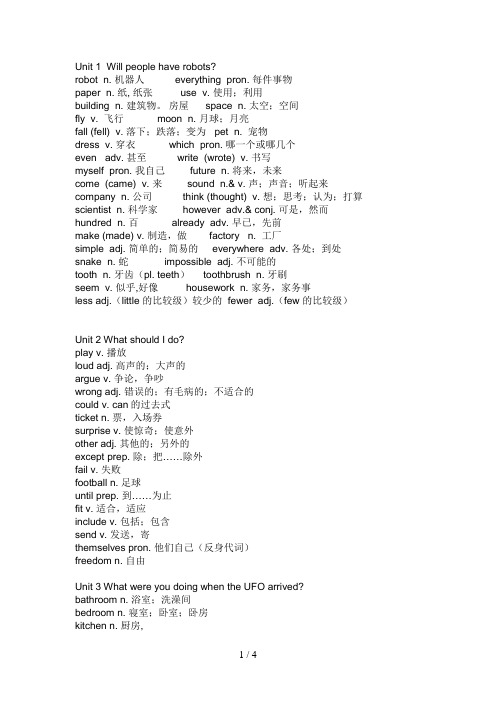
Unit 1 Will people have robots?robot n. 机器人 everything pron. 每件事物paper n. 纸, 纸张 use v. 使用;利用building n. 建筑物。
房屋 space n. 太空;空间fly v. 飞行 moon n. 月球;月亮fall (fell) v. 落下;跌落;变为 pet n. 宠物dress v. 穿衣 which pron. 哪一个或哪几个even adv. 甚至 write (wrote) v. 书写myself pron. 我自己 future n. 将来,未来come (came) v. 来 sound n.& v. 声;声音;听起来company n. 公司 think (thought) v. 想;思考;认为;打算scientist n. 科学家 however adv.& conj. 可是,然而hundred n. 百 already adv. 早已,先前make (made) v. 制造,做 factory n. 工厂simple adj. 简单的;简易的 everywhere adv. 各处;到处snake n. 蛇 impossible adj. 不可能的tooth n. 牙齿(pl. teeth) toothbrush n. 牙刷seem v. 似乎,好像 housework n. 家务,家务事less adj.(little 的比较级)较少的 fewer adj.(few 的比较级)Unit 2 What should I do?play v. 播放loud adj. 高声的;大声的argue v. 争论,争吵wrong adj. 错误的;有毛病的;不适合的could v. can的过去式ticket n. 票,入场券surprise v. 使惊奇;使意外other adj. 其他的;另外的except prep. 除;把……除外fail v. 失败football n. 足球until prep. 到……为止fit v. 适合,适应include v. 包括;包含send v. 发送,寄themselves pron. 他们自己(反身代词)freedom n. 自由Unit 3 What were you doing when the UFO arrived?bathroom n. 浴室;洗澡间bedroom n. 寝室;卧室;卧房kitchen n. 厨房,cut v. 剪;切;割,buy (bought) v. 买;购买;采购,land v. 登陆;登岸;着陆;n.国家;国土get (got) v. 得到;获得;变成;变得shirt n.. 男衬衫while conj. 而;然而;当……的时候;在……之时,around adv.& prep. 大约strange adj. 奇怪的;奇妙的;奇异的follow v. 跟随;按照;采用kid n.. 小孩;年轻人; v. 欺骗;哄骗climb v. 攀登;攀爬;爬上jump v. 跳;跃shout v. 大叫;呼喊cat n. 猫run (ran) v. 跑meet (met) v.& n. 遇见;碰见happen v. 发生accident n. 事故,意外的事plane n. 飞机modern adj. 现代的kill v. 杀死;致死bright adj. 明亮的;聪明的bell n. 钟;铃ring (rang) v.& n. 鸣;响;戒指tell (told) v. 告诉,讲述close adj. 近的;接近的; v. 关闭meaning n. 意思;含义become (became) v. 成为;变成earth n. 地球;陆地fly (flew) v. 飞;飞行;空中航行ride (rode) v. 骑脚踏车或乘交通工具旅行; n. 骑乘一段时间anywhere adv. (用于否定句中)到处;无论哪里Unit 4 He said I was hard-workingever adv. 曾经;永远 mad adj. 气愤的;疯狂的;狂热的anymore adv. (不)再;再也(不) snack n. 小吃direct speech 直接引语 reported speech 间接引语message n. 消息;信息 suppose v. 假定;认为;期望nervous adj. 紧张的;不安的 worst adj. bad的最高级true adj. 真实的 lucky adj. 幸运的copy v. 复制;抄袭 own adj. 自己的village n. 乡村 area n. 地区;区域meter n. M;公尺 thin adj. 稀薄的ate v. eat的过去时 decision n. 决定;决心husband n. 丈夫 start n. 开始;开端influence n. 影响 hometown n. 家乡;故乡danger n. 危险 border n. 边界;边境Unit 5 If you go to the party, you’ll have a great time!jeans n. 牛仔裤organize v. 组织clean-up 清除;打扫flower n. 花charity n. 慈善团体;慈善事业chance n. 机会;机遇injured adj. 受伤的;受损害的sincerely adv. 真诚地agent n. 代理人;代理商professional adj. 专业的,职业的against prep. 反对lawyer n. 律师tonight n. 今晚Unit 6 How long have you been collecting the shells?1. collect v. 收集;搜集2. pair n. 一对;一双3. since prep. & coin. 自……以来;自从4. raise v. 筹集;筹募5. several adj. 几个的;数个的6. stamp n. 邮票7. kite n. 风筝 8. store v. 储存9. anyone pron. 任何人 10. cake n. 蛋糕;糕、饼类食品11. coin n. 钱币;硬币 12. been v. 动词be的过去分词13. capital n. 省会;首都14. European adj. 欧洲的;欧洲人的 n. 欧洲15. thousand n. 一千 16. foreigner n. 外国人17. quite adv. 相当;十分 18. certain adj. 确实的;无疑的19. miss v. 思念;想念 20. common adj. 共同的;公共的21. congratulations n. 祝贺 22. monster n. 怪物23. particularly adv. 特别的,显著的 24. room n. 空间Unit7 Would you mind turning down the music?1. mind n. 介意2. yard n. 院子3. poster n. 海报4. waitress n. 女服务生5. brought v. bring的过去式6. solution n. 解答7. line n. 排;队;列 8. annoy v. 使恼怒,使生气9. annoyed adj. 恼怒的,生气的 10. polite adj. 有礼貌的;客气的 politely adv.11. perhaps adv. 或许;大概 12. return v. 归还;返回13. voice n. 声音 14. Asian adj. 亚洲的;亚洲人的15. uncomfortable adj. 不舒服的 16. impolite adj. 无理的;粗鲁的17. allow v. 允许;承认 18. public n. 公众19. cough v. 咳嗽 20. break v. 打破,违背21. smoke v. 抽烟;吸烟 22. careful adj. 当心;小心23. drop v. 落下;掉下 24. litter n. 垃圾25. behave v. 举止;表现 26. pick v. 采;摘;挑选27. Europe n. 欧洲 28. clothing n. 衣服Unit 8 Why don’t you get her a scarf?suggestion 建议;提议 album 集子;相片簿;唱片集choose 选择 personal 私人的;个人的enter 参加;进入 instead 代替;而不是advantage 有利条件;优点 mouse 老鼠receive 收到;接受 perfect 完美的;理想的besides 而且;除……之外 company 伙伴comment 评论;意见 asleep 睡着的encourage 鼓励 progress 进步;前进present 礼物 bench 长凳;长椅trendy 流行的 Sweden 瑞典special 特别的;特殊的;专门的 native 本地的;本国的。
UnitWillpeoplehaverobots?

Unit 1 Will people have robots?一、课前作文导读每个人在将来都想拥有机器人,你想要你的机器人帮你做些什么呢?Hello, my name is Lin Tao. I have a dream and I hope it will come true. I hope I will have a robot called Superman at home in 2015. It will be mybest friend and it can help me do many things. It will clean my car twice a day, it will be able to carry heavy boxes for me, it will play basketball and games with me. It also will help me clean the room or do other chores, itwill be able to go shopping for me. How wonderful it will be !二、词汇more, less, fewer I don’t agree. = I disagree.I agree (with you). in five years on computers on paper besidesmany different kinds no more be free live in as a reporter free time fall in love with …like doing sth keep a parrotbe able to do….Are you kidding?三、句型1、一般将来时用be doing表示将来:主要意义是表示按计划、安排即将发生的动作,常用于位转移的动词。
UnitWillpeoplehaverobots课文翻译

个人收集整理-ZQ,尼克:你在读什么书,吉尔?吉尔:一本关于未来地书.尼克:听起来好酷.那么未来会是什么样子呢?吉尔:嗯,城市将更加拥挤,污染将更加严重.树木将会更少,环境将极其危险.尼克:听起来真糟糕!那我们得搬到其他行星上去吗?吉尔:或许吧.但是我想住在地球上.尼克:我也是.那么我们能做些什么呢?吉尔:我们可以节约用水,还可以种更多地树.每一个人都应当尽一份力来拯救地球.,你认为你将会拥有自己地机器人吗?在观看关于未来地电影时,我们有时会看见机器人.通常它们像人类地佣人.它们帮忙做家务,或者在肮脏或危险地地方干活.文档收集自网络,仅用于个人学习现在已经有机器人在工厂里干活了.有些机器人能帮我们制造汽车,并且它们反复地干着简单地工作.将来做这样地工作地人会更少,因为它们很枯燥,但是机器人永远不会感到厌烦.文档收集自网络,仅用于个人学习科学家们正在努力使得机器人看上去像人,并且与我们做同样地事情.在日本,有些机器人会走路、跳舞.这种机器人观看起来很有趣.但是,一些科学家认为,尽管我们能够让机器人像人一样活动,却很难让它们真地像人类那样思考.例如,科学家詹姆斯·怀文档收集自网络,仅用于个人学习特认为,机器人永远不可能(像人一样)醒来后知道自己在哪里.但是,很多科学家们不同意怀特先生地观点.他们认为在到年之后,机器人甚至能够像人类那样说话.文档收集自网络,仅用于个人学习一些科学家相信,未来会有更多地机器人.然而,他们认为这可能需要数百年地时间.这些新型机器人将会有很多不同地形状,有地会看起来像真人,其他地可能看起来像动物.比如,在印度,科学家们已经制造出像蛇一样地机器人.如果建筑物倒塌了,并且还有人在里面,这些蛇形机器人能够帮助搜寻埋在建筑物下面地人.这在年前还是不可能地事,不过在年以前,电脑、火箭看上去似乎也是不可能地.我们永远不知道未来会发生什么事!文档收集自网络,仅用于个人学习1 / 1。
学生UnitWillpeoplehaverobots
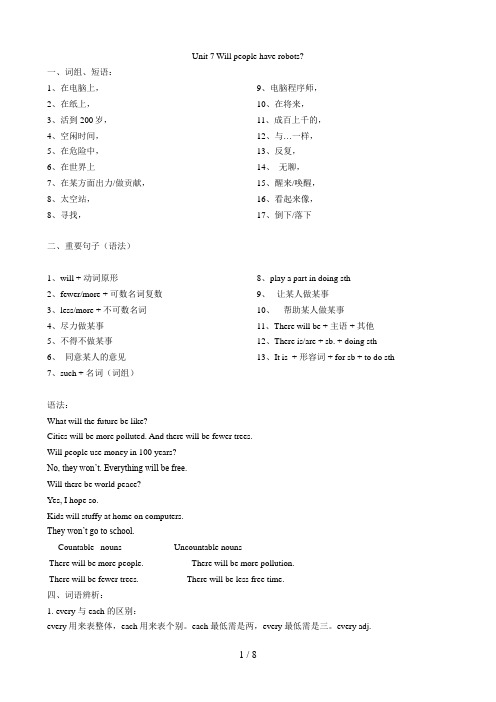
Unit 7 Will people have robots?一、词组、短语:1、在电脑上,2、在纸上,3、活到200岁,4、空闲时间,5、在危险中,6、在世界上7、在某方面出力/做贡献,8、太空站,8、寻找,9、电脑程序师,10、在将来,11、成百上千的,12、与…一样,13、反复,14、无聊,15、醒来/唤醒,16、看起来像,17、倒下/落下二、重要句子(语法)1、will + 动词原形2、fewer/more + 可数名词复数3、less/more + 不可数名词4、尽力做某事5、不得不做某事6、同意某人的意见7、such + 名词(词组)8、play a part in doing sth9、让某人做某事10、帮助某人做某事11、There will be + 主语 + 其他12、There is/are + sb. + doing sth13、It is + 形容词 + for sb + to do sth语法:What will the future be like?Cities will be more polluted. And there will be fewer trees.Will people use money in 100 years?No, they won’t. Everything will be free.Will there be world peace?Yes, I hope so.Kids will stuffy at home on computers.They won’t go to school.Countable nouns Uncountable nounsThere will be more people. There will be more pollution.There will be fewer trees. There will be less free time.四、词语辨析:1. every 与 each 的区别:every 用来表整体,each 用来表个别。
- 1、下载文档前请自行甄别文档内容的完整性,平台不提供额外的编辑、内容补充、找答案等附加服务。
- 2、"仅部分预览"的文档,不可在线预览部分如存在完整性等问题,可反馈申请退款(可完整预览的文档不适用该条件!)。
- 3、如文档侵犯您的权益,请联系客服反馈,我们会尽快为您处理(人工客服工作时间:9:00-18:30)。
Unit 7 will people have robots?单元检测一、听力(25分)I.根据所听到的句子,选择正确答语。
(5分)( )1.A.No, there isn’t B.No, there aren't C.No, there won’t ( )2.A. In two days B.Two days ago C.After two days( )3.A. People have much work to doB.There will be less free timeC. Robots can do the same things as us( )4.A.I want to live in space B.People will have more free time C.I’ll be a scientist( )5.A.Yes, I do. B.On the moon C.At ten II. 根据所听到的对话及对话后的问题,选择正确答案。
(5分)( )6.A.Yes,it will B.No, they won’t C.No, it won’t( )7.A.No, the y won’t B.At school C.At home( )8.A.There will be more cars B.We can plant more trees C. We can plant fewer trees( )9.A.A scientist B.A computer programmer C.A farmer( )10.A.Over 200 years old B.200 years old C.Less than 200 yearsIII.根据所听到的内容,选出与描述相符的图片。
有一幅图片是多余的。
(5分)AB CD E F 11_________ 12________ 13.________ 14.___________15._________ IV. 听较长对话,选择正确答案。
(5分)( )16.They are talking about_______________A.pollutionB. weather in the futureC. life in the future ( )17.What does Mary think life will be like in the future?A.There will be fewer trees.B. Everybody will have a carC. People will live longer( )18.Does Jack agree with Mary?A.Yes, he doesB. No, he doesn’tC. I don’t know( )19.Why does Jack think humans will have to look for another place to live on?Because___________.A. there will be too many buildings.B.the earth will be too hot to live onC. there will be too many people( )20.How many things does Linda predict?AOne B.Two C. ThreeV. 听短文,选择正确答案。
(5分)( )21.Will life in the future be the same as today?A.Yes, it willB.No, it won’tC. I don’t know( )22 .There will be ___________people in the world in the future.A. lessB.moreC. fewer( )puters will be much_____________.A.smalllerB.more usefulC. A and B( )24.There will be _________computer in every homeA.oneB.fewerC.at least one( )25.Travelling will be _____________.A.cheaperB.more expensiveC. useful二、基础知识(25分)VI. 根据句意及首字母提示补全单词。
(5分)26.There are many famous p_________that never came true.27.Robots can do s__________jobs as people.28.My family live in a big a____________in a big city.29.Liu Yang is the first woman a___________in China.30.It’s d_________to play with fire.VII. 用括号内所给词的适当形式填空。
(5分)31.Everyon should play a part in _____________(save)the earth.32.They can do the same job many times and not get______________(boring).33.The old man will live ______________(be)100 years old.34.It’s important __________(learn) English well。
35. Manuel always talks _____(much) but does ______.(little) So everyone likes him.VIII. 单项选择从所给的ABCD四个选项中,选择一个最佳答案。
(15分)( )36._________cars make ______pollution.It’s a serious problem.A.More。
moreB.Fewer。
lessC.Fewer。
fewer D.More。
less ( )37.I _________rockets to the moon when I grow up.A.will putB.will flyC.willD.will be( )38.I hope everything ___________free in the future.A.isB.wasC.will beD.will( )39.It’s necessary ________you _________more.A.to。
exerciseB.for。
to exerciseC.of。
exerciseD.of。
to exercise( )40.This kind of animals has lived there for____________years.A.hundredB.hundred ofC.hundreds ofD.hundreds( )41.—Would you like to have a try?-- Yes, very much. It seems__________ excitingA. isB.beC.to beD. being( )42.There _____________a new park in this city in 2020.A.is havingB. will haveC.will beD.will( )43.----Will there be less pollution?---_________________A.Yes, there’llB.Yes, there will notC.NO, there’ll notD. No, there won’t( )44.—Do you know wherer John went,Sally?--- He________went skating with his sister.A. probablyB.mayC. may beD.might( )45.My uncle went to Shanghai last week and will comeback________two daysA.toB.forC.inD.after( )46.The Internet makes it ___________for us to send information to each other ina few seconds.A.impossibleB.possiblyC.necessaryD.possible( )47.Now sectists are trying _________robots________ humans A.makeing。
look like B.make。
looks like C.to make。
look like D. made。
looks like( )48.Robots can do __________things _______us.A.the same 。
forB.the same。
asC. same。
asD.the same。
and ( )49.What will the life in the future _________?A.likeB.be likeC.lookD.look like( )50.Work hard ,and you will ____________learn English well.A. canB.able toC.be able toD.are able to三、交际运用(15分)IX. 根据对话内容,用方框内所给的句子补全对话。
有一项是多余的。
(5分) A:Do you think it is interesting to predict the future?B: Yeah.51._____________________A:I think there will be at least one car in every family.B:Really?52.___________________.Cars will make more pollution. A:No.53___________________B:That’s great! Doyou think people will have more free timein te future?A: Yes. That’s because there will be more robots to do the work.B: I hope so. 54._____________A: No. I think people will like living in the countryside in the future.B: Why?S:55________________B: You are right. Hope our future will be better and better.X. 根据对话内容,在空白处填写适当的话语,使对话完整。
